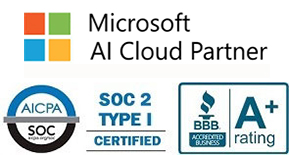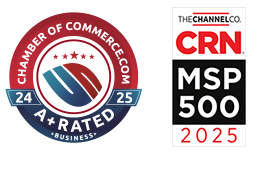IT Consulting | IT Support | Managed Services | New Jersey Computer Support Services

Modern supply chains are more complex and interconnected than ever, with businesses relying heavily on third-party vendors and partners to drive efficiency and growth. However, this ever-growing web of vendors and providers also gives criminals a larger attack surface to work with and increases potential vulnerabilities.
Effective supply chain risk management and third-party compliance play a crucial role in mitigating these risks, ensuring that all parties within the supply chain adhere to legal, ethical, and operational standards for safeguarding data and systems.
What Is Third-Party Compliance?
Third-party compliance means that any external partners or providers (including product suppliers, vendors, contractors, service providers, etc.) maintain the same standards of security and compliance as your business.
This practice makes the supply chain more secure and minimizes the legal, financial, and operational risks of using third-party services, when all of your partners are practicing the same level of compliance as you, there's less likelihood of your data being compromised through their systems.
What Are the Risks of Third-Party Non-Compliance?
Nonexistent or insufficient supply chain risk management leaves your organization vulnerable to serious threats that can have an impact on your long-term success.
Cybersecurity Threats
Third parties can serve as vulnerable entry points for cybercriminals seeking to exploit weaknesses in the supply chain. Incidents like the SolarWinds breach, where thousands of organizations were infiltrated via the software they used, show how attackers can hack larger systems through less-secure partners, leading to widespread data breaches.
Regulatory Penalties
Regulatory bodies such as GDPR, HIPAA, and CMMC hold businesses accountable for the practices and security of their partners. This means that if one of your third-party providers violates regulations and there is a breach, you can also be held responsible, be required to pay fines, and face other penalties.
Operational Disruptions
When third-party partners face compliance issues, resulting in breaches or downtime, the entire supply chain can be disrupted. These interruptions often ripple back to your business, leading to operational delays, missed deadlines, and halted deliveries.
Reputational Damage
Clients hold the companies they buy products or services from to a high standard. Breaches can quickly lead them to take their business elsewhere, even if the attack stemmed from a third party. This hit to your reputation can be difficult to recover from, making it crucial to prioritize supply chain risk management from the beginning.
What Goes into Third-Party Compliance Management?
Third-party compliance management is a detailed process that can vary from company to company, but here are a few basic elements that every business should keep in mind.
Due Diligence
Effective third-party compliance management begins with rigorous due diligence. This means thoroughly evaluating potential vendors, suppliers, or partners to ensure they meet your organization’s regulatory, ethical, and operational standards. Reviewing their security practices, prior compliance history, etc., will help you determine if they are a good fit.
Contractual Agreements
Clear contracts are key to effective supply chain risk management. Every contract should include explicit compliance clauses that outline regulatory obligations, data privacy requirements, and accountability measures. These provisions confirm that all parties are aligned on expectations and provide a legal framework to enforce compliance standards.
Continuous Monitoring
Even after initial due diligence, it's important to keep evaluating your providers' security to ensure they stay committed to compliance expectations throughout the partnership. Regular audits and reviews, as well as automated monitoring systems where appropriate, can help you and your partners stay on the same page.
Incident Response Planning
Despite preventative measures, your partners may still be hit by cyber attacks, so it's important to have a detailed incident response plan (IRP) in place. Your IRP should include steps to address and mitigate third-party breaches swiftly, which will help you contain risks, communicate effectively, and preserve stakeholder trust during challenging situations.
Which Compliance Standards Include Third-Party Compliance?
Many compliance frameworks include specific supply chain risk management guidelines and require you to be especially vigilant when working with third parties. Here's a look at a few examples of requirements you should be aware of:
-
The Cybersecurity Maturity Model Certification (CMMC) requires both direct contractors and subcontractors of the Department of Defense (DoD) to meet strict cybersecurity standards.
-
Article 28 of the General Data Protection Regulation (GDPR) states that businesses must sufficiently vet their providers to make sure they also meet GDPR standards.
-
The Health Insurance Portability and Accountability Act (HIPAA) requires that businesses enter into a business associate agreement (BAA) with their third-party providers, which outlines how they'll protect patient information.
-
ISO 28000 is a set of standards specifically for supply chain risk management and includes helpful information for performing effective due diligence.
If any of these regulations apply to your business, be sure to consult with a compliance expert to ensure you're implementing sufficient third-party compliance measures and keeping your systems safe.
How Does ICS Support and Simplify Third-Party Compliance?
Supply chain risk management and third-party compliance are detailed processes that require the right expertise and tools. ICS is fully equipped with the knowledge, experience, and resources to help you navigate third-party risk management seamlessly and make sure your entire supply chain stays compliant.
When you partner with us, you can count on our careful security and compliance, as well as support in the following areas:
-
Compliance Assessments: Carefully evaluate current third-party compliance status.
-
Policy Development Assistance: Craft clear, effective third-party compliance policies
-
Monitoring Solutions: Consistently monitor compliance with specialized tools and services.
-
Training Programs: Teach staff members their role in promoting third-party compliance.
So don't put your clients and your business at risk, take the proactive approach and prioritize your third-party compliance with the help of ICS. Send us a message to schedule your consultation and simplify supply chain risk management.
SCHEDULE AN IT Assessment
About Us:
- 150+ 5-Star Google Rated IT Firm
- Microsoft Certified Cloud AI Partner
- SOC II Certified Managed Service Provider
- Better Business Bureau A+ Rated






